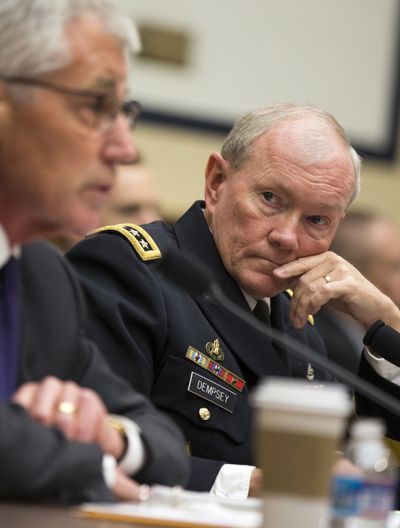Dempsey says troops in combat a possibility
Option in fight against ISIS being weighed

WASHINGTON – Less than a week after the Obama administration announced it would double the U.S. troop presence in Iraq, the chairman of the Joint Chiefs of Staff told Congress on Thursday that U.S. troops eventually might accompany Iraqi troops to the front lines in their battle to reclaim ground from the Islamic State.
Army Gen. Martin Dempsey’s comments, made during testimony before the House Armed Services Committee, further fueled concerns that the U.S. mission in Iraq is creeping toward a combat role for American troops, a prospect President Barack Obama repeatedly has ruled out.
There are currently 1,400 U.S. troops in Baghdad and northern Iraq, relatively calm parts of the country. But some of the 1,500 additional troops who are to arrive by year’s end will be deployed in areas of fierce combat, including Anbar province, 80 percent of which is controlled by the Islamic State.
Dempsey said Thursday it would take 80,000 Iraqi troops to reclaim the areas of country that the Islamic State controls, which, in addition to most of Anbar, includes the Syrian-Iraqi border and the city of Mosul, northern Iraq’s largest.
“I’m not predicting they’ll need to be accompanied by U.S. forces, but we’re certainly considering it,” Dempsey said.
Last month, Ben Rhodes, deputy national security adviser, rejected U.S. combat forces in Iraq, even if Dempsey recommended it.
“The president’s view is that we do not need to do this with U.S. combat forces on the ground,” Rhodes told the “Frontline” news program on PBS. “I can’t anticipate every hypothetical scenario, but in terms of the strategy itself, the president is very confident and comfortable with a limiting principle as it relates to combat forces on the ground.”
Pentagon officials, seeking to avoid wading into a political debate about the U.S. effort in Iraq, stressed that such a plan was months if not years away, and that any U.S. troops would not be “trigger pullers” but advisers offering their Iraqi counterparts ideas on how to best coordinate air support.
“We are not going on the offense,” said Air Force Col. Ed Thomas, Dempsey’s spokesman. “If (the Iraqi security forces) were to go after a complex objective such as Mosul, our small numbers of advisers could accompany them more closely. But we haven’t needed that yet.”
Dempsey first suggested that U.S. advisers might accompany Iraqi troops six weeks ago before the Senate Armed Services Committee.
Dempsey and Secretary of Defense Chuck Hagel sought throughout the three-hour hearing Thursday to assure the House Armed Services Committee that the additional $5.6 billion the Pentagon had requested for the dispatch of additional troops would fund an effective campaign.